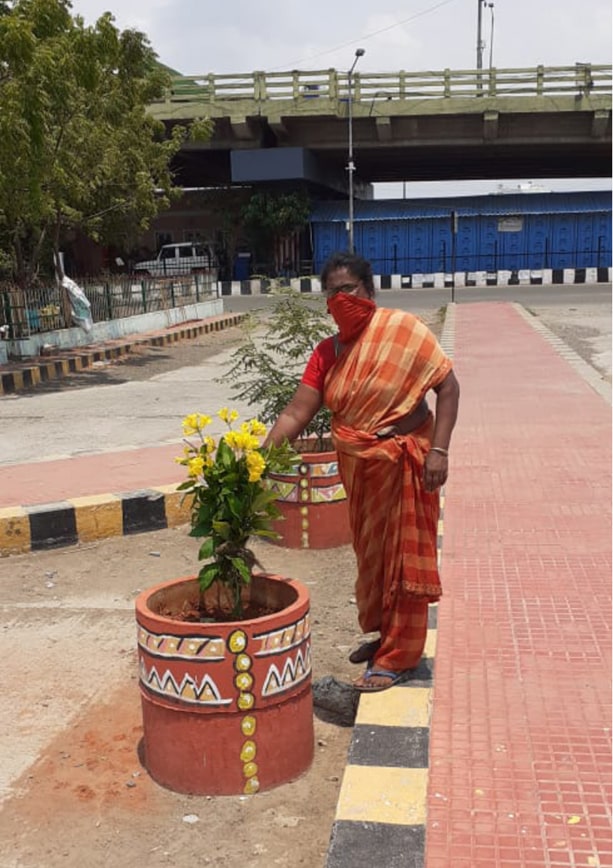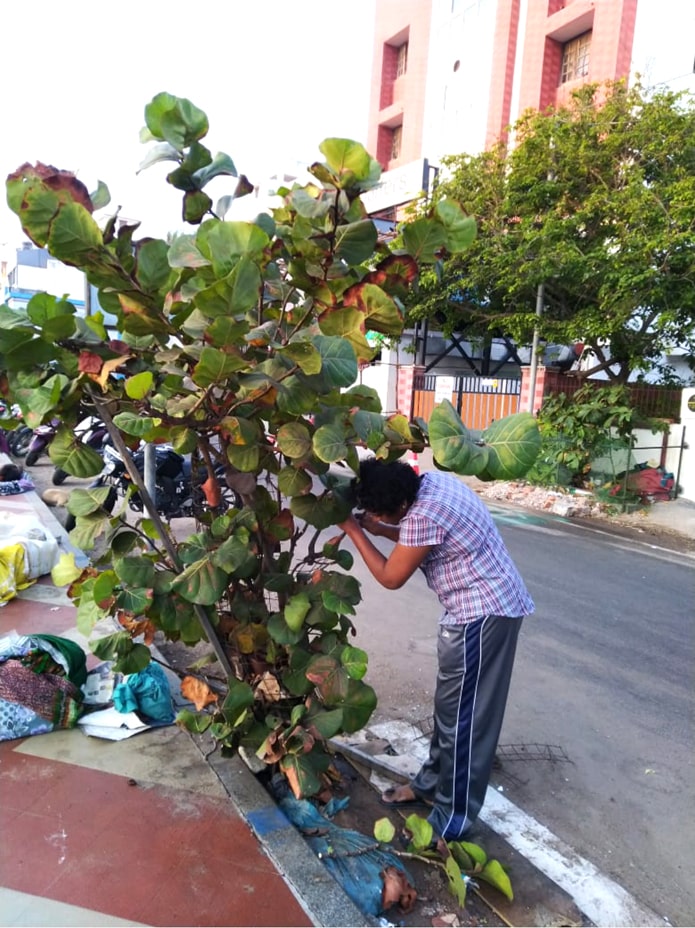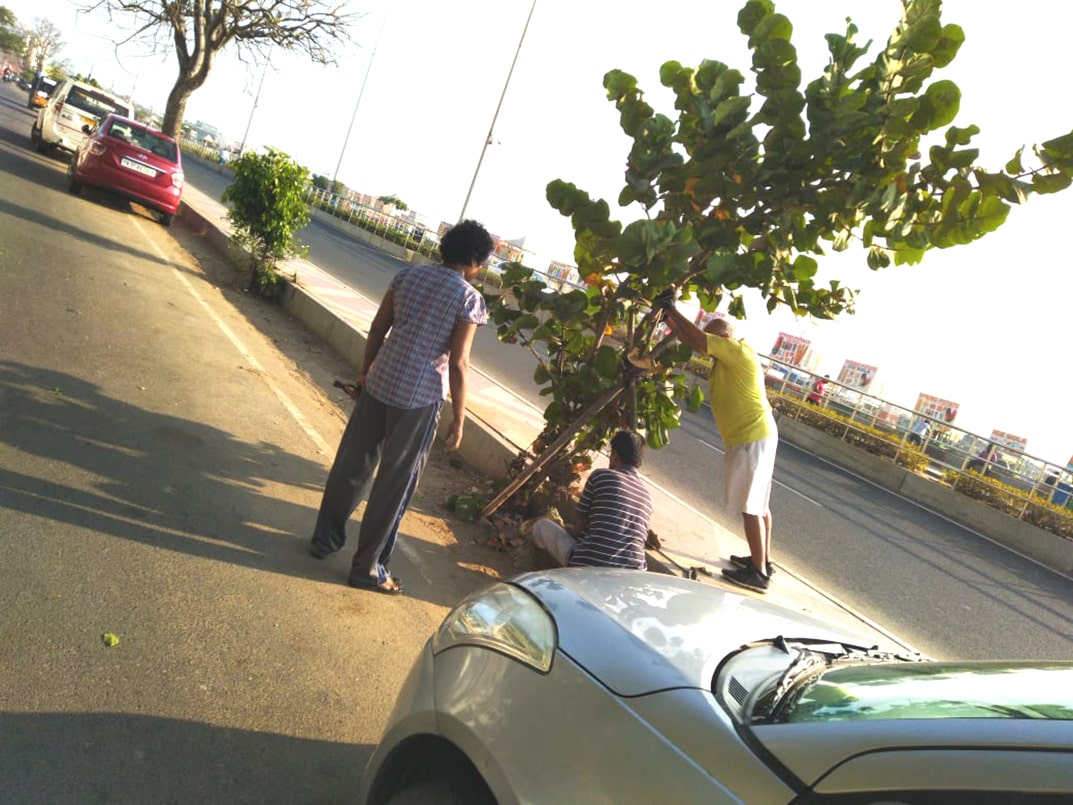Registered with the Registrar of Newspapers for India under R.N.I 53640/91
Vol. XXX No. 7, August 1-15, 2020
Nizhal’s Diverse Actions During Lockdown
by Shobha Menon
Nizhal, the NGO dedicated to trees in Chennai, has been innovating when it comes to caring for its greenery during the lockdown. Here is how.
– Editor
The COVID pandemic has meant many different things for diverse cross-sections of citizens in Chennai. For the Nizhal Team, it meant that young saplings in different sites across the city were in great distress. With public transport shutting down for over four months, the usual helpers and volunteers were paralysed. Urgent strategies were drawn up to adapt to the new situation.
Top on the list of needy sites were our recent MRTS station planting sites, which even on normal days had the most peculiar (read obstinate!) challenges – there was no water supply, no one to switch on the supply, a sprawling frontage that seriously troubled helpers, and mostly ‘confused‘ staff on site (guess they had never met the likes of Nizhal people in all their lives!). And thanks to the pandemic, things became even more chaotic!
Fortunately, in the Velachery station campus, helper Manimekalai, who joined us a month before the lockdown, turned out to be a natural carer. She braved the intense lockdown and distance constraints, conveying her ‘santhosham’ (happiness) with periodic WhatsApp updates of blooming saplings.
At the Perungudi station, our usual helper had to go in for an emergency surgery. A mom-son doctor duo, Dr. Supriya Sethumadhavan and son Dr. Aditya, rose to the dire need for the next month. Every two days, they would lug fifty litres of water from their flat campus tap, and water the saplings that wilted. Fortunately, helper Azhagamma rejoined soon after and the Railways sorted out the water concern. Aditya, who left to pursue higher studies in Paediatrics last week, says, “I thoroughly enjoyed this experience of caring for the young saplings. Happy to help!”.
 Manimekalai at the Velachery
Manimekalai at the VelacheryMRTS station.
The Taramani station site was the most challenging, with an extremely salty water source. Seeing our distress, a senior resident in the neighbourhood offered her well source. This meant that a local helper had to go through the taxing process of drawing water from the well, pouring it into two large plastic containers, placing them on a fish cart and then go around watering the saplings from end to end. Finally, last week, we managed to source water from a private tanker source (since Railways is unable to help), and our new helper is from the Perungudi area.
The Chintadripet station helper, Murugan, had more time off from his regular school job and was able to water and care for 100 odd saplings on site. Our trees at the Kasturba Nagar, Kotturpuram and Mandaiveli MRTS sites are fortunately much older and able to take care of themselves. So far, so good!
 Above: Nizhal volunteers along the Besant Avenue taking care of stake/
Above: Nizhal volunteers along the Besant Avenue taking care of stake/mulch saplings planted a couple of years ago. Below: Ayyasamy and team lift
up a sagging sea grape!
At our OMR site opposite the National Institute of Fashion Technology, the usual water tanker source abruptly stopped in March. Rashmi, a core team member lived nearby, and neighbours and friends came forward to support. They offered water supply from their apartment, and we employed a driver who helped to water saplings. For Technical Institute campuses near the same area, like the Institute Of Textile Tech and Printing Technology, we were able to follow up with the heads and the security assistants for green care.

Meanwhile, along Besant Avenue, team members coordinated with safety measures through the Nizhal Adyar What’sApp group. They took turns to nurture, stake or mulch saplings that were planted a couple of years ago. A software professional Kanakapriya and her son, and teacher Sridevi coordinated support networks, with water cans in backpacks, plastic covers to pick up trash, and small digging implements. Chithra Viswanathan, a Nizhal trustee, and ortho surgeon Dr. Ayyasamy’s well-stocked car boot provided more support with bags of leaf mulch manure, water cans, a crowbar and shovels!
At our Chitlappakkam ‘lakeside forest’, the neer vanam, core members gamely came forward to nurture saplings on weekend respites from gruelling WFH routines, masked to the hilt and armed with digging/watering implements. At the Kotturpuram Urban Forest, ongoing work includes a nursery of vanishing indigenous species, a mooligaivanam (herb garden), an asoka vanam of endangered Asoka trees and over 500 trees across the 5 acre space that was earlier a dumpyard. Throughout the lockdown months, we have been collecting seeds and raising saplings of poovandhikottai, sarakonnai, senkonrai, veppaalai and neikottaan. Fortunately our helpers Dhanam and Umapathy worked through intensive lockdown phase , braving water supply constraints from the Greater Chennai Corporation (since drivers were unavailable, only 40 per cent of water was supplied).
Sadly, the saplings we had so carefully raised in the Maadipoonga with a neighbouring community, have succumbed to a break in care during the lockdown, in spite of having a government contractor in charge. Similar situations have been reported across many green spaces in the city where maintenance staff were unavailable.
The most important lesson for us has been that local support networks are the best, whether in disaster scenarios or otherwise! Green spaces across the gracious city of Madras that is Chennai need nurturing always, even in the midst of disasters or pandemics, simply because they are and will continue to be our lifelines. We hope that more citizens join this movement and make vital differences in their own neighbourhoods.

